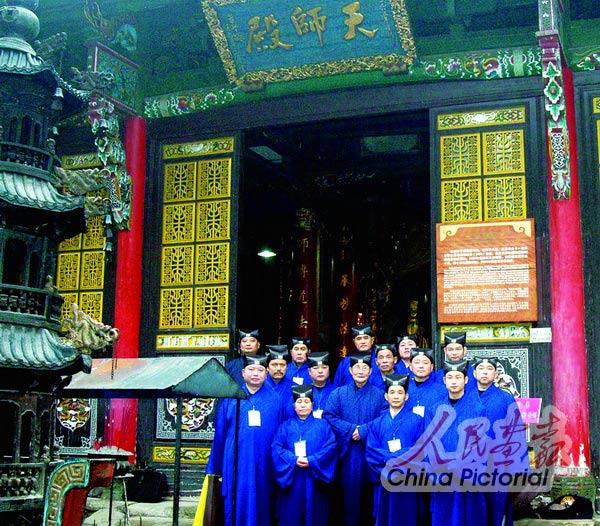Text by Tan Xingyu; Photographs by Yao Li
"The Tao that can be told of is not an Absolute Tao; The names that can be given are not absolute names." — Tao Te Ching
|

|
| Only those awarded the certificate in Tianshi Mansion can undertake Taoist services. |
An ancient classic of wisdom and philosophy,
Tao Te Ching has long remained influential in Chinese society.
In the first century, Zhang Ling settled near Longhu Mountain, Jiangxi Province, to practice Tao in accordance with Tao Te Ching. Historical records reveal that there Zhang Ling was taught by the high master of Taoism, and thereafter he established an important branch of Taoism – Tianshi Tao, literally meaning "Heavenly Master Taoism." In addition to deep cognition of the essence of worldly materials, it is said Zhang also acquired many supernatural powers, like curing the sick by conjuring and magic water. Thus he came to be revered by the local people. The Tianshi Tao he established rose to become a prevalent branch, and Zhang and his descendants, as the hereditary leaders of Tianshi Tao, are referred to as "heavenly masters." Today's is the 65th generation.
To learn more about this family-led religion boasting a history of 2,000 years, this reporter visited Longhu Mountain.
Longhu Mountain features a Danxia landform, made up of terrestrial red clastic rocks and characterized by red walls and red cliffs. Crystal Luxi River, like a jade ribbon, winds its way through the valleys, and the red cliffs and green water comprise a beautiful scene. Surrounded by the mountains is Tianshi Mansion, where the "heavenly masters" live. Historical records reveal that Tianshi Mansion, first built in 1105, underwent many renovations. The grand 900th anniversary celebration of Tianshi Mansion was held here in 2005. Now spanning 50,000 square meters, the Mansion accommodates 220 houses and its layout matches the Eight Diagrams (eight combinations of three whole or broken lines formerly used in divination) design.
Flourishing ancient trees, cultural sites and traditional architectures add more flavor to the structure. Built against the mountain and beside the river, the Mansion enjoys a favorable location according to traditional Chinese fengshui. Taoism holds the concept of "integration of man and nature," so followers are inclined to practice and learn among beautiful surroundings, like Longhu Mountain.
In Tianshi Mansion, this reporter was received by a hospitable Taoist priest named Zeng Guangliang. Priest Zeng explained that Tianshi Mansion was where Zhang Ling lived and handled Taoist affairs. Besides Tianshi Mansion are Zhengyi Abbey and Shangqing Palace. Shangqing Palace is the site at which the "heavenly masters" cast spells and pray, while the masters practice alchemy in Zhengyi Abbey. These three architectures as a whole are considered to be the holiest place of Chinese Taoism. In its prime, thousands of Taoist priests and believers made pilgrimages to here. One of the chapters in Outlaws of the Marsh, a classic masterpiece of the Ming Dynasty (1368-1644), depicted the prosperity of this religious territory.
Chinese Taoism has many sects. Among these Chhuan Chen Tao and Zhengyi Tao are the two most influential. Chhuan Chen Tao was founded in northern China in the 13th century and borrowed some thoughts from Confucianism and Buddhism. It set strict rules for the priests and promoted monk-like self-cultivation. Zhengyi Tao is originated from Tianshi Tao. Compared to Chhuan Chen Tao, it is more secular, for its disciples are allowed to consume alcoholic drinks and meat, and marry. Other differences between these two sects lie in their religious services. Chhuan Chen Tao focuses much on spiritual practice, while Zhengyi Tao involves conjuring, spells, exorcisms, praying for blessings and expelling disaster. And Zhengyi Tao's most important character is its hereditary rule with ancestral seal and sword passed down from generation to generation.
At present, there are more than 30 Taoist priests residing in Tianshi Mansion who conduct religious rites. This reporter's visit came on the 15th day of the 7th lunar month which is the "ghost festival" according to the Chinese lunar calendar. It is said that all ghosts would come to the world to look for foods on this day. Taoist priests and monks are invited to release the ghosts from purgatory and prevent the hungry ghosts from endangering the masses.
On this day, Tianshi Mansion holds the Zhongyuan Ritual Ceremony. The entire ceremony is very complicated. The priests chant sutras and conduct rites representing the offering of food to hungry ghosts accompanying to the Taoist music.
Wang Liping, the only female Taoist priest in Tianshi Mansion, has practiced here for 20 years. Besides ritual services, she is in charge of the Taoist music band. "Taoism believes that music can communicate ghost and deity. So there are many chants and music accompaniments during Taoist rites. The musicians are all Taoist priests," Wang explained. Every afternoon, the band rehearses. Wang and her colleagues also perform abroad. "Traditional Chinese religious music is very popular with foreign audiences." Wang is married and her daughter, a university graduate, studied the same major as Wang – music.
Home to one of the most distinctive religions in China, Tianshi Mansion draws large numbers of tourists from home and abroad. "In the past, only Tianshi Mansion could certify a qualified Taoist priest. We believe all the Taoist priest should be the students of 'heavenly masters.' Only those who are awarded the certificate here can undertake Taoist services. So it is no exaggeration to say that Tianshi Mansion is the holy place of Taoism," priest Zeng Guangliang explains.